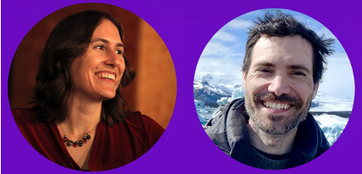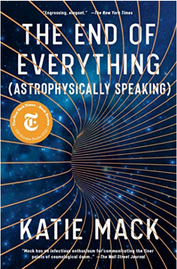 Astrophysicists Katie Mack and JJ Hermes share some of what they have learned from studying the cosmos.Despite the title of the recent (and very entertaining) movie, Don’t Look Up, we find there are many good reasons to look to the skies. As we enter the third year of the pandemic, many of us have been focused on near-term, often unpleasant things:
Astrophysicists Katie Mack and JJ Hermes share some of what they have learned from studying the cosmos.Despite the title of the recent (and very entertaining) movie, Don’t Look Up, we find there are many good reasons to look to the skies. As we enter the third year of the pandemic, many of us have been focused on near-term, often unpleasant things:
- Avoiding COVID by drastically curtailing social events, indoor situations, and time with friends, colleagues, and loved ones.
- Staying hyper-informed and processing often seemingly conflicting new information.
- Wearing high-quality masks, washing hands, sanitizing surfaces, and social distancing.
- Getting vaccinated, boosted, and tested…and tested…and tested.
On the positive side, despite this era’s specific challenges to our mental health, we can bolster our psyches by spending time in nature. Time in the wild is called forest-bathing by the Japanese and friluftsliv by the Swedes, while the benefits of time near the water are examined in the book, Blue Mind: The Surprising Science That Shows How Being Near, On, or Under Water Can Make You a Happi....
But you don’t need to confine your nature therapies to planet Earth. Now that we can see and measure more of the Milky Way and the many galaxies beyond, we can experience a greater degree of awe and marvel at our massive, breathtaking cosmos. These are exciting times, astrophysically speaking!
And new advances in engineering (most notably, the James Webb Telescope) are helping us identify and measure things previously unseen and unquantified in our cosmos.
 Source: NASA. Credit: Chris Gunn
Source: NASA. Credit: Chris Gunn
We are excited to have two brilliant astrophysicists kick off this year’s first Statistically Speaking, highlighting some of their research in the near and far reaches of the cosmos. Professor JJ Hermes will share research about the search for planets around white dwarf stars. Professor Katie Mack will expand on her favorite subject, reflected in the title of her best-selling book, The End of Everything: (Astrophysically Speaking).

Their curiosity to find answers about the universe, and contemplate our place in it, is inspiring. While we can look up (and it turns out that star-gazing is also great for your mental health), our naked eye can only see so far. With the aid of some very sophisticated tools, we will be able to see and measure a great deal more. Exciting times indeed! And while we can look forward to future observations that have been enabled by these tools, let this excerpt from The End of Everything: (Astrophysically Speaking) give you something to contemplate:
"Everything you see is in the past…. If you look up at the Moon, you’re seeing a little over a second ago. The Sun is more than eight minutes in the past. And the stars you see in the night sky are deep in the past, from just a few years to millennia."
We hope you will join us for the livestream on Jan. 27 at 1:00 p.m. ET. If that time isn’t convenient for you, the recording will be made available along with other previously recorded Statistically Speaking webinars.
You must be a registered user to add a comment. If you've already registered, sign in. Otherwise, register and sign in.